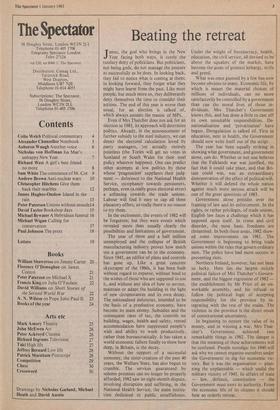Beating the retreat
T anus, the god who brings in the New J Year facing both ways, is surely the tutelary deity of politicians. But politicians, not being gods, do not manage the posture as successfully as he does. In looking back, they fail to notice what is coming at them; in looking forward, they forget what they might have learnt from the past. Like most people, but much more so, they deliberately deny themselves the time to consider their actions. The end of this year is worse than usual, for an electiOn is talked of, which always unseats the reason of MPs.
Even if Mrs Thatcher does not ask for an election in 1983, its approach will determine politics. Already, in the announcement of further subsidy to the steel industry, we can detect the electoral calculation loved by party managers, yet actually entirely pointless (the Tories will get no votes in Scotland or South Wales for their steel policy whatever happens). One can predict other attempts at low politics by those whose 'pragmatism' supplants their judg- ment — deference to the National Health Service, sycophancy towards pensioners, perhaps, even (a really gross electoral error) a softening towards the trade unions. Labour will find it easy to cap all these placatory offers, so really there is no reason to try them.
In the excitement, the events of 1982 will be forgotten; but they were events which revealed more than usually clearly the possibilities and limitations of government.
The year of three and a half million unemployed and the collapse of British manufacturing industry proves how much use a government can be to the economy. Since 1945, an edifice of plans and controls has gone up. Like a great concrete skyscraper of the 1960s, it has been built without regard to expense, without heed to the wishes of those who are supposed to use it, and without any idea of how to service, maintain or adapt the building in the light of new circumstances and its own decay. The nationalised industries, intended to be the basis of a productive economy, have become its main enemy. Subsidies and the consequent rates of tax, the controls on building, wages, health and safety, rented accommodation have suppressed people's wish and ability to work productively, rather than bureaucratically. It has taken a world economic failure finally to show how deep, in Britain, is the decay.
Without the support of a successful economy, the sister-creation of the past 40 years, the Welfare State, has also begun to crumble. The services guaranteed by solemn promises can no longer be properly afforded; 1982 saw an eight-month dispute, involving disruption and suffering, in the National Health Service, the main institu- tion dedicated to public unselfishness. Under the weight of bureaucracy, health, education, the civil service, all devised to be above the squalors of the market, have become the areas of greatest lethargy, strife and greed.
What was once guessed by a few has now become obvious to many. Economic life, by which is meant the material choices of millions of individuals, can no more satisfactorily be controlled by a government than can the moral lives of those in- dividuals. Mrs Thatcher's Government knows this, and has done a little to cast off its own unsuitable responsibilities. De- nationalisation and 'privatisation' have begun. Deregulation is talked of. First in education, next in health, the Government should now write itself out of the script.
The year has been equally striking in showing what government, and government alone, can do. Whether or not one believes that the Falklands war was justified, the fact that it could take place, and that Bri- tain could win, was an extraordinary demonstration of the effect of political will, Whether it will defend the whole nation against much more serious attack will be one of the great questions of 1983.
Government alone presides over the framing•of law and its enforcement. In the rights, or rather privileges, of trade unions, English law faces a challenge which it has imposed upon itself. In crime and civil disorder, the most basic freedoms are threatened. in both these areas, 1982 show- ed some improvement on 1981. The Government is beginning to bring trade unions within the rules that govern ordinary men. The police have had more success in preventing riots.
Northern Ireland, however, has not been so lucky. Here lies the largest strictly political failure of Mrs Thatcher's Govern- ment, and the biggest regression of 1982 the establishment by Mr Prior of an un- workable assembly, and his refusal to follow the political logic of accepting responsibility for the province by in- tegrating with the rest of the realm. The violence in the province is the direct result of constitutional uncertainty.
In beginning to restore the value of its money, and in winning a war, Mrs That- cher's Government achieved two remarkable things in 1982. The danger is that the meaning of these achievements will be confused. People nostalgic for 1940 will ask why we cannot organise ourselves under the Government to dig for economic vic- tory. But it was the organisation — plan- ning the unplannable — which undid the military victory of 1945. In affairs of state — law, defence, constitution — the Government must exert its authority. From the economic life of its citizens it should beat an orderly retreat.


































 Previous page
Previous page